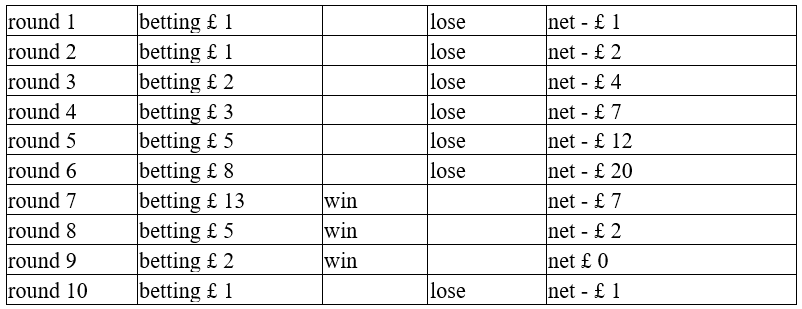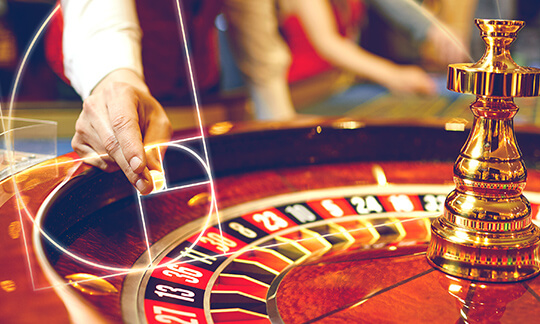Roulette strategy in-depth: Fibonacci Betting System
In previous posts we introduced some betting systems deployed at roulette tables, be it in real-life casinos or at online roulette tables. Many come with their clear advantages and disadvantages, but few have become as famous and well-used among roulette players as the Fibonacci system. With the never-ceasing popularity of roulette among other casino games and the advent of live table gaming, Fibonacci and his accomplishments in the field of mathematics are still as relevant as ever. In fact, one could argue the works of mathematicians are experiencing a renaissance of some sorts, with popular culture using bits and pieces seemingly at every turn to keep us interested. But what do we really know of the man? Certainly a question worth asking before diving deeper into roulette strategy, sequence control and gambling systems in general.

The life of Fibonacci
Before his findings could be used as the base for roulette strategy in order to better put wagers into a sequence and keeping one's bankroll in check, the man himself of course was born in the year 1170, at least that's about the year most experts can agree on. Born to a Pisan merchant who later was appointed consul of an trade enclave in the area of Bugia in North Africa, his father's position allowed for young Fibonacci to be exposed to mathematics at an early age already. Sent to study calculations with an Arab master, his later studies had him travel to Egypt, Syria, Greece and Sicily. Naturally, traveling the Mediterranean coastline like this resulted in the young Fibonacci being exposed to different numerical systems and arithmetic applications.
The impact of these experiences should become extremely evident when Fibonacci released his Liber Abaci in 1202. At the time most of Europe was still using Roman numerals. With his work Fibonacci laid out the advantages of Hindu-Arabic numerals and illustrated countless arithmetic examples where these "new" numerals would reduce work or simply speed necessary operations up. The effect was groundbreaking. The widespread adaptation of Arabic numerals across the continent can be traced back to Fibonacci's work directly.
In his work, Fibonacci dived into laws of proportions, daily mathematical operations, the position of numerals in Arabic numbers for quick identification, properties of numbers, extraction of roots and even some geometry and algebra. He also went in-depth on using Arabic numerals for currency conversion, accounting purposes, calculating profits and interest rates and proper use of an abacus for calculations.
His work and follow-up publications became so famous that even the Holy Roman Emperor took notice. Summoned before Frederick II., our scholar was faced with having to solve three problems at court, the final of which he even solved by using "modern" means of approximation. His proposed solution ended up being correct to nine decimal places. Or in layman terms: Fibonacci was quite the impressive figure himself.
So impressive in fact, that around 1240 he was granted an official salary by decree in the nation of Pisa in recognition of his services in the field of accounting. People nowadays would accuse him of having "sold out" perhaps, but really, let that sink in. A young man traveling the Mediterranean coasts learning arithmetic from traveling merchants and scholars, publishing an era-transitioning body of work in his early 30s and almost single-handedly pushing nations into adapting different numerals in his own lifetime.

The Fibonacci Sequence
The Fibonacci Sequence was originally conceived in an attempt to mathematically approximate the growth of a given population of rabbits under idealized conditions - far removed from matters of roulette. His solution, an increasing number each generation, would later become known as the Fibonacci sequence, or simply "Fibonacci numbers". It is also some evidence eastern mathematics had on him, since this particular sequence had already been described by Indian mathematicians centuries earlier.
This is also where we circle back to betting in online casinos in general and roulette strategy in particular. Many betting strategies have used a Fibonacci betting system in the past, with roulette strategy definitely being the field of its most consistent application throughout the decades. When it comes to roulette systems, the Martingale system and the Fibonacci system are without a doubt the most popular ones by far. Keep in mind that while there is no sure way to predict where on the roulette wheel the ball will land each spin, systems like the Fibonacci betting system are designed to make the most out of your bankroll without suffering from negative progressions and to keep you with a perspective for your next bet, no matter if you are playing on an European or American roulette wheel.
The Fibonacci betting system as part of your roulette strategy
When it comes to playing roulette - be it at an online casino or a land-based casino - many roulette players seemingly pick numbers at random. Seasoned players will quickly be able to spot certain patterns in other players' bets or employ wager systems of their own. In a majority of cases these patterns and system will be based on the Fibonacci sequence of increasing numbers. It is also commonly used for setting wagers at the craps table, but we will cover this game in a future article.
The Fibonacci system in action
Whenever you wish to control your bankroll while betting on even money wagers, this roulette system should be the one you choose. It works the same in land based casinos and online casinos and is very easy to understand. You will only be betting on odd/even numbers on the roulette wheel, or red/black. To illustrate the sequence better, let's have a look at this table:

In this example we played 10 rounds staring at the roulette wheel, following the Fibonacci sequence for our wager every time we lost. As a result we lost quite a bit of money for the first 6 rounds. In round 7 we got lucky and won, and due to the size of our wager we were already able to negate more than 50 % of our losses! Now we went ahead and reduced our wager again in accordance with our roulette strategy and kept winning, further catching up with our losses from previous rounds at the roulette wheel.
Why did we go down with our wager upon winning? Because the Fibonacci system is a negative progression system, meaning that upon losing we move along the number sequence and upon winning we move back 2 positions if possible. Even after 10 spins of mostly losses, we are still only down 1 pound. This is the strength of this roulette system and the reason many new players catch on to terms such as "negative progression" or "Fibonacci betting system" so quickly. It's simply a more systematic and understandable approach to roulette in particular and casino games as a whole! Try it out yourself in our European Roulette, American Roulette or French Roulette games.

Advantages of the Fibonacci roulette system
The biggest advantage of this roulette system is the fact it's only used on even-money bets. This way, even deep into the sequence, payouts can make up for losses and while you are keeping track you are also training your brain to deal with numbers better.
Two things, however, will end up spoiling the fun when it comes to this roulette strategy. The house edge is ever present and will make any attempt of regulating your bankroll efficiently futile in case of a streak of bad luck. Roulette is, after all, a game of chance. Another factor when gambling at a casino will be the table limit. Imagine a table limit of £100 for example. Following the Fibonacci sequence, the highest possible number under that limit would be 89. Hitting it would mean you'd be stuck for your next bet, losing at that limit would not be possible to recover from. Your bankroll would suffer dearly as a result.
Especially new players will often look for "foolprof" strategies to win at games such as roulette. In truth, however, most of these system are best used to keep track of one's bankroll and betting history that visit. As long as you keep in mind that games of chance do not follow strict rules and will not bend to your will you should be able to enjoy yourself no matter which specific roulette strategy you are following this time.










